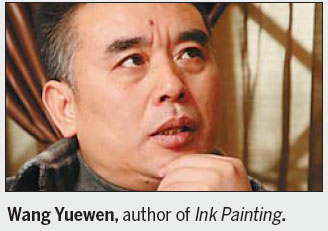
 'Taken 2' grabs movie box office crown
'Taken 2' grabs movie box office crown
 Rihanna's 'Diamonds' tops UK pop chart
Rihanna's 'Diamonds' tops UK pop chart
 Fans get look at vintage Rolling Stones
Fans get look at vintage Rolling Stones
 Celebrities attend Power of Women event
Celebrities attend Power of Women event
 Ang Lee breaks 'every rule' to make unlikely new Life of Pi film
Ang Lee breaks 'every rule' to make unlikely new Life of Pi film
 Rihanna almost thrown out of nightclub
Rihanna almost thrown out of nightclub
 'Dark Knight' wins weekend box office
'Dark Knight' wins weekend box office
 'Total Recall' stars gather in Beverly Hills
'Total Recall' stars gather in Beverly Hills
Why officialdom still sells
Updated: 2013-01-29 10:18
By Mei Jia (China Daily)
|
||||||||

Though Wang Xiaofang refuses to place his works in the category of so-called officialdom literature, he is still considered an important force of this much-loved genre.
On average, officialdom novels sell at least 100,000 copies, according to Qingdao-based Peninsula City News. They frequently top bestseller lists for both bookstores and online reading, soaring to millions in sales.
Experts say readers look to the books to peep into scenes they're eager to know more about and to learn workplace skills.
"Unlike other writers' books, reading my books can't lead you to the ways of promotion in your career life," Wang says.
Fudan University professor Zhang Taofu believes the craze also shows Chinese people's ongoing fascination with political power.
"The lack of full transparency in power operations in a sense raises public curiosity in digging out the dirt behind the scenes. That's why officialdom novels are popular," says Dun Li, as quoted by Chinawriter.com.cn.
Though some critics argue Chinese writing on the theme goes back hundreds of years, Wang Yuewen is recognized for starting the contemporary trend in 1999 with his novel Ink Painting. His latest work Greenish Yellow echoes his sharp satire and observation on corruption and power fights among county-level officials.
Huang Xiaoyang gets fans with his No 2 Chief Officer, centering on a journalist-turned-secretary to a provincial governor.
Hou Weidong's Notebook, by Xiaoqiao Laoshu, opens a window on officials at different levels, with "small potato" Hou's promotion from a village official to provincial leader over a 10-year period.
Most Viewed
Editor's Picks

|

|

|

|

|

|
Today's Top News
Boston bombing suspect reported cornered on boat
7.0-magnitude quake hits Sichuan
Cross-talk artist helps to spread the word
'Green' awareness levels drop in Beijing
Palace Museum spruces up
First couple on Time's list of most influential
H7N9 flu transmission studied
Trading channels 'need to broaden'
US Weekly

|

|







